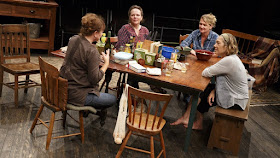Can you blame them, really, given the state of the world right now? What did you expect, indeed?
 |
| Joan Marcus |
Nelson's process, which you can learn more about here, makes for remarkably up-to-date theater; in rehearsals and being frantically rewritten up until opening night, What Did You Expect? was frozen on September 16th, and takes place just prior to the first presidential debate. But the Gabriels' conversation goes no deeper into politics than your average American family's does, and this turns out to be both curiously reassuring and precisely the point. The Gabriels are certainly concerned about the upcoming election, but they're also preoccupied by a multitude of other matters, all of which are discussed at length, if never neatly, stagily, artificially resolved.
Thomas's mom, Patricia, can no longer live on her own, but her room at the retirement home costs a lot more than the Gabriels had anticipated or find they can afford. Thomas's first wife, Karin, has started renting a room in the Gabriel house, which helps the retired Mary a little with finances. Thomas's brother, George, and sister-in-law, Hannah, might sell or rent their place nearby and move in with Mary too, since the old-age home and their only son's college tuition have them sliding dangerously toward deep debt by the day. Thomas's sister, Joyce, needs to leave early to get back to Brooklyn for work; she's a little tense, especially since she and her mother haven't been getting along too well. The whole family is surprised and saddened by just how quickly their beloved piano, sold to cover some of mom's nursing home expenses, was snapped up by an aspiring (and clearly moneyed) opera singer studying nearby at Bard College. There's the growing class divide in the Hudson Valley, a picnic tomorrow with people George and Hannah aren't quite sure they like or trust just yet, and, of course, the national mood. One of the characters neatly sums up this last concern by musing over how scared everyone she knows is, and how dirty they all claim to feel lately.
What Did You Expect?, directed with great sensitivity by the playwright, and superbly performed by the company, demonstrates just how much weight even the most mundane of conversations can take on. Talk around the table--whether about town gossip, new acquaintances, old memories, or what various younger-generation Gabriels are up to these days--yields a deeply probing portrait of a close-knit, contemporary, white, middle-class family living in turbulent and unsettling times. It's a testament to the playwright and his players that the show--essentially a bunch of aging white people quietly chatting and chopping for nearly two hours--feels as genuine, familiar, moving, and revelatory as the Gabriel cycle does so far. The Gabriels may not be real, but their conversation sure feels like it is. It speaks volumes about who we are and how we're doing as the darkness settles over the nation. How curious, rare, and strangely comforting it is to connect with characters who don't offer pat, stagey morals or easy platitudes before the final curtain. The Gabriels are weary and concerned and a little bit lost, but then, their audiences are, too. I'm hoping that for all they're going through--for all the bruises life has handed them lately--the Gabriels will be okay as long as they hold on to each other. Believe me when I tell you that I've been hoping as much for us all.

No comments:
Post a Comment